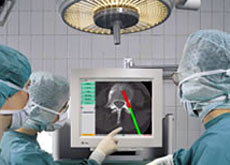Synthes results highlight medtech boom

Medical devices company Synthes says its 2004 net profit rose more than fourfold – throwing the spotlight on Switzerland's rapidly growing medtech sector.
The Solothurn-based firm,
one of just 27 listed on the Swiss Market Index (SMI), said on Wednesday that net profit rose 331 per cent to $323.7 million (SFr372.2 million).
But the bottom line was significantly boosted by the completed acquisition of German competitor Mathys, meaning that the comparable year-on-year rise in net profit was a more modest 18 per cent.
Revenue grew by 45 per cent to reach $1.78 billion, while the comparable year-on-year increase was 20 per cent.
Synthes president and CEO Hansjörg Wyss said the results clearly demonstrated that the SFr1.5 billion takeover of Mathys had transformed the company into a “truly global enterprise”.
The Synthes results follow an impressive performance from other Swiss (or Swiss-based) medtech companies, including dental implant market leaders Nobel Biocare and Straumann, digital hearing devices manufacturer Phonak, and the diagnostics division of pharma giant Roche.
The world leader in the sector, Medtronic of the United States, has its European headquarters near Lausanne.
Great white hope
But these “household names” are only the tip of Switzerland’s medtech iceberg.
Switzerland now has about 500 companies of varying size listed as active in the largely export-led sector, employing some 40,000 people.
Anita Soltermann, a project leader for export and locational promotion at the State Secretariat for Economic Affairs (Seco), told swissinfo that medtech – together with biotech – represented the fastest-growing and most promising economic sector in Switzerland today.
One industry observer went further, commenting that – at a time when many manufacturing firms are relocating production to countries with lower labour costs – the two sectors represented the “great white hopes” of the Swiss economy.
The size of the Swiss market is currently estimated at around $1.5 billion per year, compared with $65 billion for the neighbouring European Union and $200 billion worldwide.
Export-led
However, the real growth prospects are abroad, with medtech exports accounting for $4.6 billion out of a total of $4.9 billion sector-wide revenue in 2003.
The 2003 figure represented a 17.9 per cent increase on the previous year, and exports have grown by an average of 13.3 per cent every year since 1996.
The total export revenue figure includes sales by foreign medtech companies based in Switzerland – primarily Medtronic, which distributes pacemakers Europe-wide from the Netherlands but does its European bookkeeping in Switzerland.
Nonetheless, the Swiss medtech sector proper exported equipment worth nearly $1.3 billion in 2003 – a 25 per cent increase over the previous year.
And figures for share in total national export revenue tell a similar story.
In 1988, medical devices accounted for barely 30 per cent of total Swiss exports of precision instruments, but the 2003 figure was nearly 60 per cent.
While still modest in overall terms – total Swiss exports in 2003 totalled just over SFr130 billion – the growth rate is impressive.
Reasons to excel
Broadly speaking, medical technology is the part of the life sciences sector involved with researching, developing, producing and marketing systems and devices for medical applications for humans or animals.
In practice, that can mean anything from bone surgery devices (Synthes) via dental implants to pacemakers, digital hearing aids, medical imaging and diagnostics, drug delivery systems and organ replacements.
The Swiss excel in medical technology for several reasons.
Firstly, the country has a large number of skilled workers, with backgrounds in relevant fields including electrical engineering, mechanics, micro systems and precision measurements.
It is probably no coincidence that today’s medtech “clusters” have developed in the same areas that constitute the heart of the country’s precision watchmaking industry –– particularly the Jura, Lake Geneva and Basel-Solothurn areas.
Other advantages include the high density of hospitals and medical research and development institutions in Switzerland.
One thing is for sure: as long as people keep living longer and national health care systems continue to pay for the latest – and most expensive – technologies, the prospects for the sector look healthy in the extreme.
swissinfo, Chris Lewis
Solothurn-based Synthes develops, produces and markets instruments, implants and biomaterials for use in surgery worldwide.
2004 revenue: $1.78 billion (+44.8%).
Operating profit: $527.6 million (+131%).
Net profit: $323.7 million (+45%).
Earnings per share: $2.83 (+316%).
Employees: 6,711 (+56%).
Synthes is not the only Swiss medtech company enjoying rapid net profit growth.
Along with biotech, medtech represents the great hope of the Swiss economy, which is increasingly driven by the export of high-precision, high-tech goods.
The sector still represents only a fraction of total exports, but it is growing at more than 13% per year.

In compliance with the JTI standards
More: SWI swissinfo.ch certified by the Journalism Trust Initiative










You can find an overview of ongoing debates with our journalists here . Please join us!
If you want to start a conversation about a topic raised in this article or want to report factual errors, email us at english@swissinfo.ch.